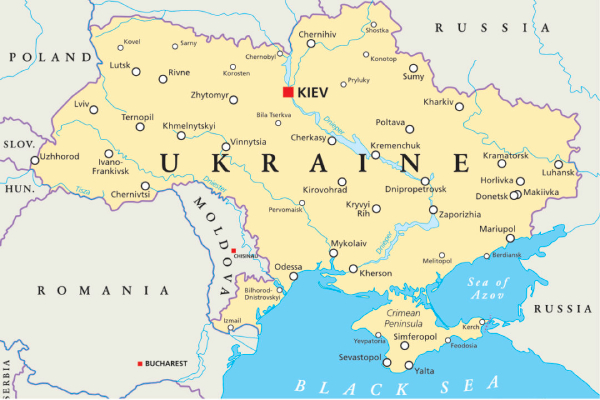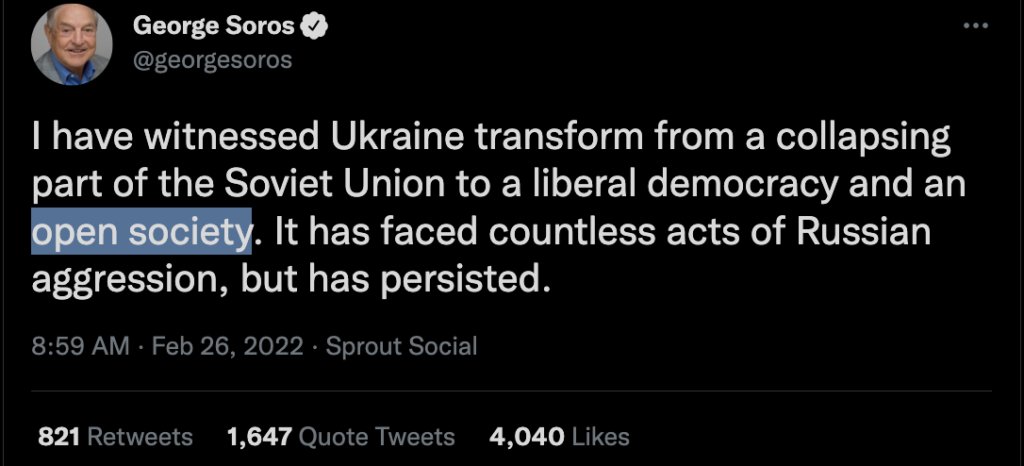Guest Post by American Stoic
Fortunately, after two years of non-stop Covid-19 news, we have finally reached a reprieve, unfortunately, it comes in the form of a new war. When Putin and Russia decided to invade Ukraine on February 23rd, it was both expected and shocking. The world had been preparing for this eventuality for months, but that does not make the instigation of a global conflict any less jarring.
In the short period, around 100 hours, since the siege of Ukraine began, we have already learned a lot about Ukraine’s fighting spirit, Russian military tactics in the 21st century, and how social media will affect the information flow surrounding conflict moving forward. The last in the list has proved to be immensely interesting, already we have seen Russia target Ukrainian internet service providers (ISPs), even so, we have been provided with essentially endless amounts of information from the conflict. Mixed in with that however has been widespread misinformation, time will tell who was behind it and what their motivation was. Fake stories like the soldiers of Snake Island and the Ghost of Kyiv became internet sensations within minutes as the world anxiously watched the conflict on social media.
Despite all of the breathless coverage and opinions, from basically everyone with a device capable of connecting to the internet, one question seems to be strangely lacking from the conversation, why?
Is Putin simply motivated by an archaic desire to revitalize the Soviet Union, like the Western media seems to be implying? Why is the media not commenting on his assertion that he is “fighting Nazis” in Ukraine?
It seems that daily, we are learning more about the reasons behind the events in Ukraine, but as of today these seem to be the major considerations largely undiscussed in our media. Ukraine joining NATO, and thereby completing the positioning of more hostile forces along their border, is a security risk to Russia, but what else is at play here.
Timing
While there has been no corroborating evidence to support this as of yet, the timing of Putin’s move on Ukraine is interesting. No, I am not talking about how Putin took Georgia under Bush, Crimea under Obama, and now the rest of Ukraine under Biden, oddly skipping over the 4 years he was supposedly in control of the United States government via President Trump.
Rather, the date, February 23, is the 8th anniversary of the passage of a law by the Ukrainian Parliament to remove the Russian language as the second official language of Ukraine. This bill was one of the first actions taken by the brand new Ukrainian Government following the United States-backed coup, headed by then-Vice President of the United States Joseph Robinette Biden. In a 2018 article, Eric Zuesse for Modern Diplomacy wrote, as though he had a crystal ball,
If America’s successful February 2014 overthrow and replacement of Ukraine’s democratically elected neutralist Government doesn’t soon produce a world-ending nuclear war (World War III), then there will be historical accounts of that overthrow, and the accounts are already increasingly trending and consolidating toward a historical consensus that it was a coup […] i.e., that the termination of the then-existing democratic (though like all its predecessors, corrupt) Ukrainian Government, wasn’t authentically a ‘revolution’ such as the U.S. Government has contended, and certainly wasn’t at all democratic, but was instead a coup
Putin both knows that Biden was responsible, and seems to have chosen the date of his revenge for symbolic reasons.
Chemical Weapons Facilities
It may not be just traditional or nuclear weapons that Russia is worried about being positioned on their border. In February of 2020, the United States State Department accused Russia of disinformation after they claimed the Coronavirus was a CIA biological weapon. Given the National Institute of Health admitting late last year they funded “gain-of-function” research in the Wuhan lab, this theory may be worth re-examining.

In April of 2021, Putin’s Chief Security Advisor, Nikolai Patrushev, claimed he had “good reason to believe” that the United States was developing Chemical Weapons in Ukraine and close to the border of Russia. Although the United States categorically denied this, a Twitter account compiled a thread on this issue that was immediately suspended after starting #USBiolabs trending. One of the points of interest is there are US labs in Ukraine but they are classified as part of the “Biological Threat Reduction Program.”
According to the website for the U.S. Embassy in Ukraine,
The U.S. Department of Defense’s Biological Threat Reduction Program collaborates with partner countries to counter the threat of outbreaks (deliberate, accidental, or natural) of the world’s most dangerous infectious diseases. The program accomplishes its bio-threat reduction mission through the development of a bio-risk management culture; international research partnerships; and partner capacity for enhanced bio-security, bio-safety, and bio-surveillance measures. The Biological Threat Reduction Program’s priorities in Ukraine are to consolidate and secure pathogens and toxins of security concern and to continue to ensure Ukraine can detect and report outbreaks caused by dangerous pathogens before they pose security or stability threats.
The Embassy also deleted the map of their labs in the country in the last 24 hours. You can still access documents listing the addresses of the facilities via the “Wayback Machine.” There are at least two facilities close to the border of Ukraine and Russia, one in Kharkiv and one in Luhansk. A full list can be found here.
Challenging the West and the Dollar
Perhaps the most consequential thing that could come out of the Ukrainian conflict, outside of a nuclear war, is how it could be the catalyst behind the restructuring of the global economy. As the West leverages more and more sanctions against Russia to bring them to heel in Ukraine, we run the risk of creating a legitimate and immediate challenge to the economic dominance of the West.
“Whatever doesn’t kill you only makes you stronger.” If these sanctions do not kill the Russian fighting spirit, it could be the incentive needed for their domestic industries to rival those of Western countries. Combine this with the rapid economic growth their BRICS partners are poised to undergo, and the West needs to be careful lest the latter half of the 21st century will be dominated by Eastern economies, cut from a much different ideological cloth.
CulturalHusbandry’s Substack today covers the economic chess match underlying the Ukraine conflict in great detail. Russia and China realize they have aligned interests. They have been working in tandem to challenge the supremacy of the dollar for at least seven years by divesting their holdings in the dollar, negotiating trade deals in their national currencies, and creating alternatives to Society for Worldwide Interbank Financial Telecommunication (SWIFT). Russia and China now use the dollar for less than 50% of all bilateral transactions, down from 90% in 2015,
As CulturalHusbandry writes,
This blind to reality concept that Western leadership has of “The US dollar controls all” is based on fading truths as we operate diplomatically with our head in the sand.
These things take time, and I am not saying that the culminating moment of de-dollarization happens tomorrow or next week. But make certain it IS happening and there may be no better opportunity than now for Russia to take the sanctions the West has placed upon them and run with it. If they do, the long-term decoupling of the Russian and Asian worlds from the dollar as this plays out over 10-20-50 years reestablishes the global order.
Bonus Point: George Soros Supports Ukraine’s “Open Society.”

That is all. -> https://www.opensocietyfoundations.org/
